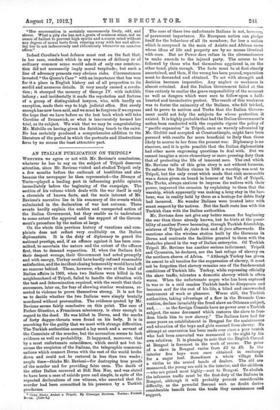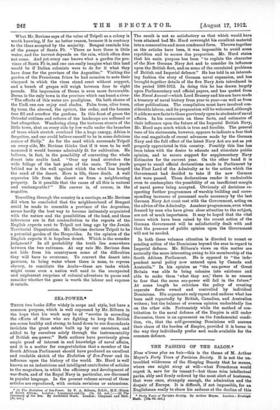AN ITALIAN PUBLICATION ON TRIPOLI.* WHETHER we agree or not
with Mr. Bevione's conclusions, whatever be has to say on the subject of Tripoli deserves attention, since Mr. Bevione visited and studied Tripoli only a few months before the outbreak of hostilities and also because the newspaper he then represented—the Stampa of Turin—played a leading part in influencing public opinion immediately before the beginning of the campaign. The section of his volume which deals with the war itself is only a chronicle of known facts, and the main interest of Mr. Bevione's narrative lies in his summary of the events which culminated in the declaration of war last autumn. These events hardly explain the sudden and unexpected action of the Italian Government, but they enable us to understand to some extent the approval and the support of the Govern- ment's procedure by the nation at large.
On the whole this previous history of vexations and com- plaints does not reflect very creditably on the Italian diplomatists. It is the duty of diplomacy to guard the national prestige, and, if an offence against it has been com- mitted, to ascertain the nature and the extent of the offence first, then to demand reparation. If, when the Italians felt their deepest wrongs, their Government had acted promptly and with energy, Turkey could have hardly refused reasonable satisfaction, and the incident closing honourably would have left no rancour behind. Those, however, who were at the head of Italian affairs in 1908, when two Italians were killed in the neighbourhood of Tripoli, failed to handle the situation with the tact and determination required, with the result that their successors, later on, for fear of showing similar weakness, re- sorted to violence to prove themselves strong. It is not for as to decide whether the two Italians were simply brutally murdered without provocation. The evidence quoted by Mr. Bevione seems fairly conclusive on this point. The case of Father Giustino, a Franciscan missionary, is clear enough in regard to the deed. He was killed in Derna, and the marks of forty dagger-thrusts were found on his body. It is in searching for the guilty that we meet with strange difficulties. The Turkish authorities accused a lay monk and a servant of the Consulate of the murder, but the accusation seems to lack evidence as well as probability. It happened, moreover, that by a most unfortunate coincidence, which could not but in- crease the suspicion of the Italians, the telegraphic communi- cations which connect Derna with the rest of the world broke down and could not be restored in less than two weeks ; ample time—thinks Mr. Bevioni—for destroying true proofs of the murder and for providing false ones. The death of the other Italian occurred at Sidi Ben Nur, and was stated to have been a case of suicide pure and simple, in spite of the repeated declarations of one witness, who asserted that the murder had been committed in his presence by a Turkish gendarme.
• Cone Siam, Andati a Tripoli. By Giuseppe Bevione. Torino: Fratelli vaa. [Lire 5,] The case of these two unfortunate Italians is not, however, of paramount importance. No European nation can pledge itself for the behaviour of all its members; far less a nation which is composed in the main of Asiatic and African races whose ideas of life and property are by no means identical with ours. But no Power dare refuse in the circumstances to make amends to the injured party. The course to be followed by those who feel themselves aggrieved is, on the other hand, plain enough. The facts must be at first clearly ascertained, and then, if the wrong has been proved, reparation must be demanded and obtained. To act with strength and decision becomes imperative. Any neglect or weakness is almost criminal. And the Italian Government failed at the time entirely to realize the grave responsibility of the moment as well as dangers which were sure to follow upon a half- hearted and inconclusive protest. The result of this weakness was to foster the animosity of the Italians, who felt tricked, and to prove to natives and Turks that the Italian Govern- ment could not help the subjects for whose protection it existed. It is highly probable that had the Italian Government's action been conducted with the requisite vigour the policy of "pacific expansion" in Tripoli, once so warmly advocated by Mr. Giolitti and accepted at Constantinople, might have been pursued with results far more beneficial to Italy than those likely to accrue to her from the present war. Diplomacy is no sinecure, and it is quite possible that the Italian diplomatists had other more engrossing questions to deal with. But we cannot imagine a more elementary or more pressing duty than that of protecting the life of innocent men. The end which Mr. Bevione tells of this grim story is not without humour. To enforce the Italian claims in 1908 a warship was sent to Tripoli, but the only event which made that visit memorable was a dance given on board in honour of the Vali of Tripoli. The Turks, always anxious to impress the natives with their power, improved the occasion by explaining to them that the warship, which apparently was making a long stay in the har- bour, was in reality held by them as a hostage for debts Italy had incurred. No wonder Italians were treated later with scant respect by the natives. But the fault rests less with the Turkish than with the Italian authorities.
Mr. Bevione does not give any better reason for beginning the war than those already known, but he hints at the possi- bility of another Power becoming, through Turkish friendship, mistress of Tripoli de facto first and de jure afterwards. He mentions also the wireless station built by the Germans in Derna and contrasts the facilities granted to them with the obstacles placed in the way of Italian enterprise. Of Turkish Tripoli Mr. Bevione has another serious indictment. Tripoli and Cyrenaica„ he declares, are the last refuge of slavery on the northern shores of Africa. " Although Turkey has given its assent to all treaties for the suppression of slavery, it must not be forgotten that slavery remains one of the fundamental conditions of Turkish life. Turkey, while repressing officially the slave traffic, tolerates a domestic slavery which is often worse. When the unfortunate negro who has been captured in war or in a raid reaches Turkish lands he disappears and becomes serf for the rest of his life, a blind and unrewarded instrument of work or pleasure. Worse still, the Turkish authorities, taking advantage of a flaw in the Brussels Con- vention, declare invariably the freed slave an Ottoman subject, and, . . . as the foreign Consuls have no power over a Turkish subject, the same document which restores the slave to free- dom binds him to new slavery." The Italians have had for some years an establishment in Bengazi for the maintenance and education of the boys and girls rescued from slavery. No attempt at conversion has been made ever since a poor wretch
who had been converted was massacred in the night by his
own relatives. It is pleasing to note that the English Consul at Bengazi is foremost in the work of rescue. The price of a slave in Bengazi varies from £2, to .E8. In the interior five boys were once obtained m exchange for a sugar loaf. Sometimes a whole vThilleageold are
falls a victim to the armed bands of dealers.
massacred, the young are sold in the interior, and the children —who are prized most highly—sent to Bengazi. o the infamous traffic must be the first duty of the Italians in Bengazi, although it will probably present considerable difficulty, as the powerful Senussi sect no doubt derive considerable benefit from the trade they countenance and support. What Mr. Bevione says of the value of Tripoli as a colony is worth knowing, if for no better reason, because it is contrary to the ideas accepted by the majority. Bengasi reminds him of the pampa of Santa Fe. " There as here there is little water, and the harvest depends on the rain, which often does not come. And yet every one knows what a garden the pro- vince of Santa Fe is, and one can easily imagine what this land would be if Italian colonists were to do for it what they have done for the province of the Argentine." Visiting the garden of the Franciscan friars he had occasion to note their vineyard in which the vines stand erect without support, and a bunch of grapes will weigh between four to eight pounds. His impression of Derna is even more favourable. Dente is the only town in the province which can boast a river- " The effects of this water are prodigious. On both shores of the 1Jadi one can enjoy cool shades. Palm trees, olive trees, fig trees, the almond, the apricot, the cedar, and the banana tree fill and overflow the gardens. In this feast of green the Oriental outlines and colours of the landscape are softened or lost altogether. Wandering along the tortuous streets of the little town, shut on every side by low walls under the branches of trees which stretch overhead like a huge canopy, Africa is forgotten, and one could believe oneself to be in some delicious corner of Sicily." As for the sand which surrounds Tripoli on every side, Mr. Bevione thinks that if it were to be well manured it would become admirably fit for cultivation. He believes, in fact, in the possibility of converting the whole desert into arable land. "Over my head stretches the wide foliage of the last palm of the oasis. Three yards behind me is the wall against which the wind has heaped the sand of the desert. Here is life, there death. A wall separates life from the desert as from a neighbouring property. Is it possible that the cause of all this is natural and unchangeable P " His answer is, of course, in the negative.
Travelling through the country in a carriage, as Mr. Bevione did when he concluded that the neighbourhood of Bengazi could be made to resemble a province of the Argentine, seems hardly the best way to become intimately acquainted with the nature and the possibilities of the land, and these inferences are in flat contradiction to the, reports of the English experts sent to Tripoli not long ago by the Jewish Territorial Organization. Mr. Bevione declares Tripoli to be a potential garden of the Hesperides. In the opinion of the English experts it is hopeless desert. Which is the sounder judgment ? In all probability the truth lies somewhere between the two extremes. At any rate Mr. Bevione does not hide from his countrymen some of the difficulties they will have to overcome. To convert the desert into pastures, to bring water where there is none, to repress slavery, to conciliate the Arabs—these are tasks which might cause even a nation well used to the unexpected and unpleasant surprises of colonial adventure to pause and consider whether the game is worth the labour and expense it entails.







































 Previous page
Previous page